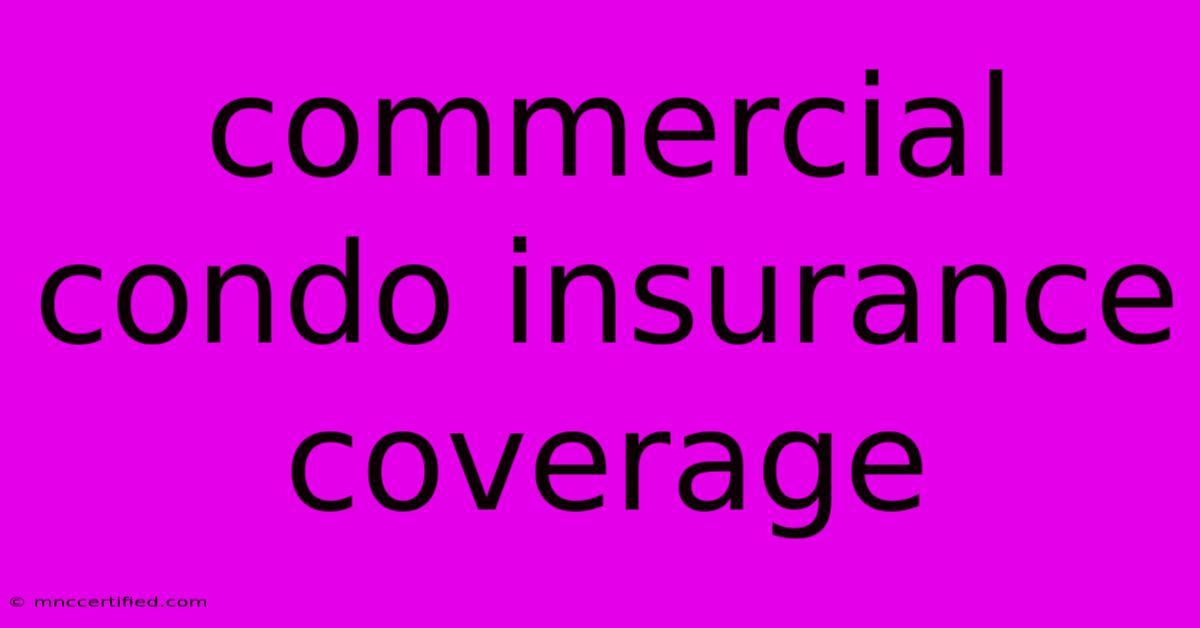Commercial Condo Insurance Coverage

Table of Contents
Commercial Condo Insurance Coverage: Protecting Your Investment
Owning a commercial condo unit can be a smart investment, offering the benefits of ownership with the convenience of shared amenities. However, it's crucial to understand the unique risks associated with commercial condos and ensure adequate insurance coverage. This article delves into the essential aspects of commercial condo insurance, helping you navigate the complexities and safeguard your investment.
What is Commercial Condo Insurance?
Commercial condo insurance is a specialized policy tailored to the needs of business owners residing in commercial condominium units. It's distinct from traditional commercial property insurance, as it focuses on covering the individual unit's interior and personal property, while the condominium association's master policy covers the building's exterior and common areas.
Key Coverages to Consider:
1. Building Coverage:
- Unit Interior: This covers damage to your unit's interior, including walls, floors, fixtures, and built-in appliances, from covered perils like fire, theft, or vandalism.
- Personal Property: This protects your business equipment, inventory, furniture, and other assets within your unit against covered perils.
2. Liability Coverage:
- Commercial General Liability: This protects you against financial losses arising from third-party claims for bodily injury or property damage occurring within your unit or due to your business operations.
3. Additional Coverages:
- Business Income Coverage: This compensates for lost income if your business operations are interrupted due to a covered event, like fire or flood.
- Equipment Breakdown Coverage: This protects against damage to your business equipment caused by mechanical or electrical failures.
- Flood Insurance: In areas prone to flooding, this coverage is crucial to protect your business assets against water damage.
Understanding Your Condo Association's Master Policy:
It's crucial to understand your condo association's master policy and its coverage limitations. This policy typically covers:
- Building exterior: The building's exterior structure, common areas, and shared amenities.
- Common area liability: Liability for injuries or damages occurring in common areas.
However, the master policy may not cover:
- Unit interiors: Damage to your unit's interior is usually excluded.
- Personal property: Your business assets within the unit are not covered by the association's policy.
How to Choose the Right Commercial Condo Insurance:
- Assess your specific risks: Consider the potential hazards unique to your business and location.
- Review your association's master policy: Understand the coverage limitations and potential gaps.
- Compare quotes from multiple insurers: Seek out competitive rates and coverage options.
- Work with an experienced insurance broker: A qualified broker can help you understand your specific needs and find the right coverage.
Key Factors Affecting Your Premiums:
- Location: Buildings in high-risk areas may face higher premiums.
- Building age and condition: Older or poorly maintained buildings may have increased risks.
- Business type: Certain industries carry higher insurance costs due to inherent risks.
- Coverage limits and deductibles: Higher coverage limits and lower deductibles result in higher premiums.
Conclusion:
Commercial condo insurance is an essential component of protecting your business investment. By understanding the key coverages, your association's master policy, and the factors influencing premiums, you can make informed decisions and ensure adequate protection. Consult with an insurance professional to obtain tailored advice and navigate the complexities of commercial condo insurance.

Thank you for visiting our website wich cover about Commercial Condo Insurance Coverage. We hope the information provided has been useful to you. Feel free to contact us if you have any questions or need further assistance. See you next time and dont miss to bookmark.
Featured Posts
-
Can Saudi Arabia Become A Biotech Powerhouse
Nov 13, 2024
-
Skai Jackson Shares Pregnancy News Baby Joy
Nov 13, 2024
-
Doves Announce 2025 Uk Tour Goodwin Not Involved
Nov 13, 2024
-
Elon Musk Vivek Ramaswamy Trumps New Team
Nov 13, 2024
-
Can You Withdraw An Insurance Claim
Nov 13, 2024